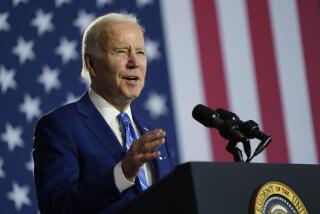Clinton Said to Soften Child Vaccine Effort
WASHINGTON — The Clinton Administration has agreed to compromise on its proposal to give all American children free vaccinations, agreeing to limit coverage to children from poor families or those without health insurance, congressional sources said Tuesday.
Children covered by private insurance that pays for immunization would not be eligible for free vaccines, the sources said.
The compromise, agreed to by Administration officials and House Democrats, would still meet the Administration’s goal of providing every child with access to vaccines, the sources said.
The agreement, which still must win House and Senate approval, addresses a number of concerns raised by the pharmaceutical industry and Republicans in Congress.
Under the Comprehensive Children’s Immunization Act, proposed by the Administration last month, the federal government would have bought and distributed all childhood vaccines to private doctors and public clinics across the country--essentially monopolizing the purchase of those drugs.
The pharmaceutical industry objected, arguing that the government controls would dry up their profits, force severe cuts in industry spending to develop new vaccines and possibly curtail funds for research into drugs for such diseases as herpes and AIDS. Many Republicans shared those concerns and also objected to the $1.1-billion cost of the program.
Under the compromise, the secretary of health and human services would negotiate a “consolidated purchase price to buy vaccines in bulk to distribute to the states for eligible children,” sources said. The agreement stipulated that the secretary was not bound to buy from a single source, which means that vaccines could be purchased from several companies--also a significant issue for vaccine manufacturers.
The new legislation was negotiated by officials at the Department of Health and Human Services and Reps. John D. Dingell (D-Mich.), chairman of the House Energy and Commerce Committee, and Henry A. Waxman (D-Los Angeles), chairman of its subcommittee on health and the environment, sources said.
Waxman said Tuesday that the new proposal “accomplishes the original goal of the Clinton Administration: to assure that every child in America has access to vaccines and that there are no cost barriers to children being immunized.
“The compromise proposal does so at a lower cost, recognizing that we do not have the resources to respond as fully as the Administration initially suggested,” he said. The cost of the revised program was not immediately available.
In announcing the plan in February, Clinton harshly attacked the pharmaceutical industry for raising prices. While the nation’s immunization rates have fallen to 59%, the lowest level in the Western Hemisphere aside from Haiti and Bolivia, drug companies have been sharply raising prices.
A complete set of immunization for one child rose from an average of $23 a decade ago to $200 today, Clinton said at the time.
Waxman said later, however, that much of the increase stemmed from new vaccines and from a government tax to fund a program to compensate children who suffered reactions from the vaccines.
The compromise legislation was worked out as part of the budget reconciliation process, which must be completed in the House by May 14. Although the Senate, which has a mid-June deadline, has not yet addressed the issue, Republican senators offered a $450-million alternative Tuesday to Clinton’s original plan.
The GOP proposal is similar to the compromise in many respects, but it would give states the authority to require proof of immunization as a condition of receiving welfare assistance under the Aid to Families with Dependent Children program.
More to Read
Get the L.A. Times Politics newsletter
Deeply reported insights into legislation, politics and policy from Sacramento, Washington and beyond. In your inbox three times per week.
You may occasionally receive promotional content from the Los Angeles Times.










